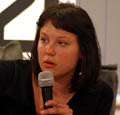
Architectural Education - Yvette Vašourková
City Library Ostrava, June 16, 2006
Organizers: Era 21 and Center for New Architecture (CNA)
Graduate of the Faculty of Architecture of Czech Technical University. Currently a student in the postgraduate program at the Berlage Institute in Rotterdam. She is a co-founder of the Center for Central European Architecture in Prague (CCEA). Two Architectures in One School: Duplication Across the Czech RepublicYvette Vašourková: In my opinion, we are facing the inability to cooperate within one university. I really do not understand why it is not possible to expand the faculty of architecture and concentrate those interested in studying architecture there. When I was at the Technical University in Munich, the architecture faculty even did not teach any construction disciplines because that was provided by the civil engineering faculty.Craft or Creativity?Yvette Vašourková: Czech architectural education is very good if we want it to teach students the craft. Of course, we can say that it is good for each teacher to assert their own opinion on teaching, and this will achieve a diversity of educational approaches. The problem is that there is no diversity of approaches in our system. I have experience mainly with the older generation of teachers, who have been unwilling to look outside or seek new teaching methods. On the contrary, from the beginning, they tried to impose their vision of architecture on their students. However, I felt a lack of the opportunity to discuss the meaning of architecture and the position of the architect. When I look at the Berlage Institute - I know it is not exactly a typical school, it is more of a research institute - the approach is the opposite: we will not teach you what a house's layout should look like, but we will teach you to form your own opinion on architecture, to be able to argue it, because otherwise you will not be able to get anywhere further. Our schools produce architects who can create a solid house for their clients, but they do not have their own path in creating architecture.Yvette Vašourková: Is the superstructure creativity? For you, is the craft first and then creativity? Yvette Vašourková: In my opinion, it is much more beneficial not to burden the student with constructions or craft when they first encounter architecture. It is important to develop a conceptual approach so that their perspective and outlook are not lost right at the beginning, as often happens here. It is crucial for the student to remain aware, even after mastering the craft, that they are creating a concept. Yvette Vašourková: I believe that the emphasis on craft stifles creativity, and it starts in school. I am convinced of this because when we were working on the Young Blood project, I could see the vast differences between us and other countries. Young Blood sought to map the situation of young Central European architects, who had to express their relationship with architecture and the meaning of architecture through an installation of 3.6 m. The theme was very open, and when young Czech architects presented themselves, there were very few interesting installations. The architects from Austria, but also from Hungary or Poland, were much more interesting. They were more interesting because they were more open to conceptual thinking. This openness has its origin in school. Teacher and SystemYvette Vašourková: Just recently, we were discussing at the Berlage Institute how many people from where have studied at this school. I was very surprised that I and Jirka Pavlíček are the only two Czech students in the entire history of the Berlage Institute, which has been functioning since 1991. One shocked student from Colombia said: "That's impossible, there were at least twenty of us here." It is a pity that, to say it in quotes, ten of your graduates are only working abroad because it is extremely important for them to go to renowned foreign schools, and if we talk about how great our education is, then we will not get anywhere.Yvette Vašourková: That there is often no partnership relationship between teacher and student at Czech schools is a fact that even the teacher may regret, because they can only gain from mutual respect. On the other hand, the fault may not only lie with the teacher but also with the students. They should also learn to be more proactive and try to discuss, not just chat online. FutureYvette Vašourková: I have always been an optimist and believe that a younger generation will come to schools. I do not claim that this will lead to a radical shift and completely replace those who have been at the school for years, but at least help create a more diverse environment.photograph: Petra Koryčánková
|
The English translation is powered by AI tool. Switch to Czech to view the original text source.
0 comments
add comment













